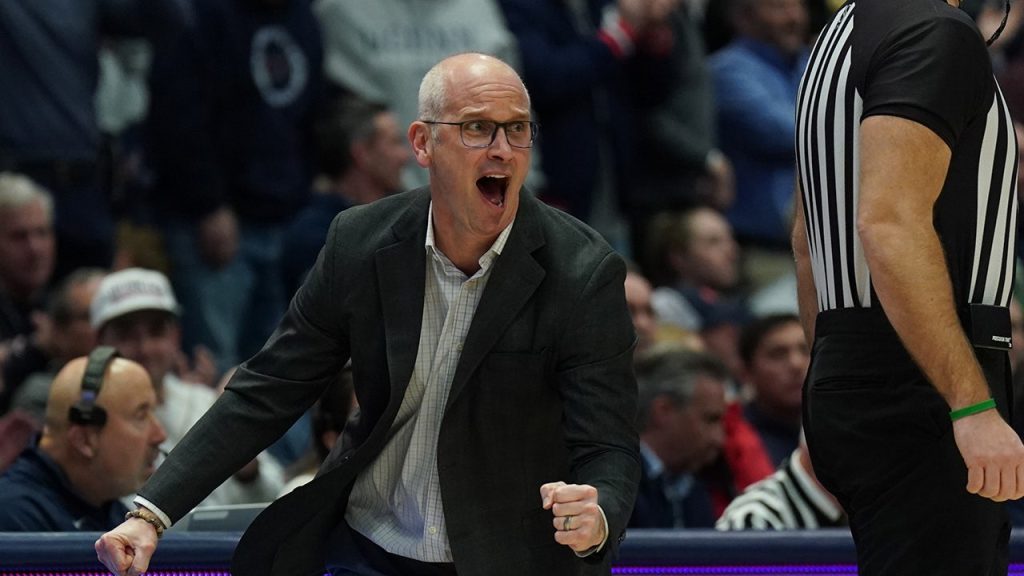Dan Hurley, the fiery head coach of the UConn men’s basketball team, found himself in the spotlight once again on Tuesday night, not for his team’s hard-fought overtime victory against Butler, but for his heated exchange with a game official. Hurley, a two-time national championship-winning coach, has cultivated a reputation for his intensely expressive interactions with referees. This particular incident, however, escalated beyond his typical demonstrative behavior and into a viral moment captured by broadcast cameras. The incident occurred late in the first half, with UConn holding a comfortable ten-point lead. Displeased with a no-call on a perceived foul during a defensive rebound attempt, Hurley approached the referee to argue his case. The official, seemingly uninterested in engaging with Hurley’s protestations, turned his back, prompting Hurley’s now-infamous outburst: “Don’t turn your back on me, I’m the best coach in the f—ing sport.”
The clip of Hurley’s expletive-laden comment quickly spread across social media, further solidifying his image as a volatile and outspoken coach. In his post-game press conference, Hurley didn’t deny making the remark. Instead, he offered a somewhat defiant explanation, emphasizing his desire for better communication from officials. With a smirk, he acknowledged the comment, adding, “I’m gonna sound like an a–hole here – I want some level of communication too.” He went on to suggest that his interactions with referees are not unique, but that he is disproportionately targeted by broadcast cameras.
Hurley’s defense centered on the notion that other coaches engage in similar behavior, but are rarely subjected to the same level of scrutiny. He argued that the cameras often miss similar outbursts from other coaches, creating a skewed perception of his conduct. “I just wish they put the camera on the other coach more,” he stated, highlighting his belief that other Big East coaches are just as demonstrative in their dealings with officials. He acknowledged the role he has played in creating this perception, admitting, “I’ve created this for myself. I’m not the victim.” However, he maintained that the constant camera focus on his actions unfairly amplifies his behavior and fuels negative commentary on social media.
Hurley’s comments raise questions about the role of broadcast cameras in shaping public perception of coaches and the fairness of focusing on one individual’s behavior while potentially overlooking similar actions by others. He suggests that the constant attention encourages online criticism and allows for selective editing of clips to portray him in a negative light. He feels unfairly singled out and portrayed as a “monster” for behavior he believes is commonplace among coaches. This incident adds another layer to the ongoing debate about the appropriate level of interaction between coaches and officials and the influence of media coverage on public perception.
The game itself, a tightly contested 80-78 overtime win against Butler, was overshadowed by the controversy surrounding Hurley’s outburst. Despite the distraction, UConn managed to secure their fifteenth consecutive home victory at the XL Center, rebounding from a recent loss to Creighton that snapped a 28-game home winning streak. Sophomore guard Solo Ball led the Huskies with a career-high 23 points, showcasing the team’s resilience and ability to perform under pressure. While the incident with the referee undoubtedly stole the headlines, UConn’s on-court performance demonstrated their continued strength and determination in the competitive Big East conference.
This latest incident fuels the narrative surrounding Dan Hurley, painting him as a passionate yet sometimes volatile coach. Whether or not his behavior is justified, the constant camera attention and subsequent social media scrutiny have undoubtedly contributed to his reputation. It remains to be seen how this incident will impact his interactions with officials moving forward and whether the focus on his sideline demeanor will overshadow his team’s accomplishments. The debate regarding the appropriate level of interaction between coaches and officials and the role of media in shaping public perception continues, with Dan Hurley firmly at the center of the conversation.

